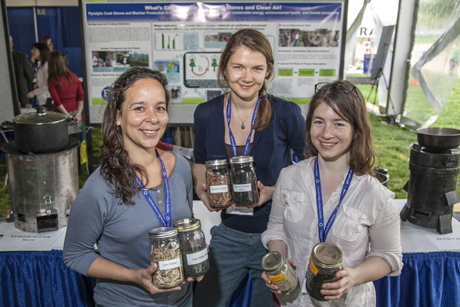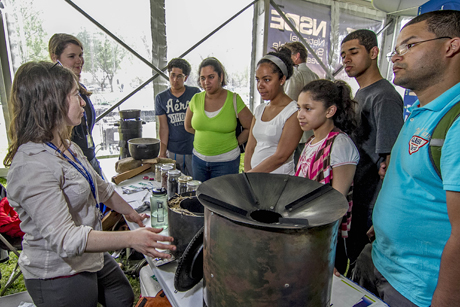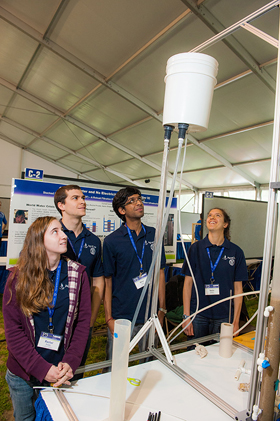Two student teams win coveted EPA prize
By Blaine Friedlander


Two Cornell student teams – a cookstove fuel/biochar group and the AguaClara water filtration project – won the U.S. Environmental Protection Agency’s prestigious People, Prosperity and the Planet (P3) Award June 19. With about 45 teams in the competition, Cornell was the only school with two of the seven winning teams.
The P3 Award competition was held in April at the annual National Sustainable Design Expo in Washington, D.C., and the winners were announced last week. Each winning team now qualifies to receive a grant of up to $90,000 to further develop their design.
Student projects were designed to protect people’s health, the environment, encourage economic growth and use natural resources efficiently.
The winning project, “Pyrolytic Cook Stoves and Biochar Production in Kenya: A Whole Systems Approach to Sustainable Energy, Environmental Health and Human Prosperity,” featured graduate students Dorisel Torres, Marie Zwetsloot, Rachel Hestrin and David Guerena, all in the field of crop and soil science; and Jennifer Davis ’13 and Tedman Hsu, M.Eng. ’13, of engineering. Their faculty advisers are Johannes Lehmann, professor of crop and soil science; and Elizabeth Fisher, professor of mechanical engineering.

The students developed pyrolysis cookstoves, a low-oxygen environment, to reduce fuel needed, decrease indoor air pollution and diminish greenhouse gas emissions. Resultant biochar can be added to soil as a soil-amendment or fertilizer to reduce synthetic fertilizer usage and pollution, to sequester carbon, and to improve soil health for crop growth.
The other winning project, “AguaClara Stacked Rapid Sand Filtration – A Robust Filtration Process for Sustainable Drinking Water Infrastructure,” featured Nadia Shebaro ’15, Rachel Proske M.Eng. ’13, Kristopher LePan, M.Eng. ’13, and Mihir Gupta M.Eng. ’13. Paul Charles, Cornell technologist, helped to fabricate the filter. Their faculty advisers are Monroe Weber-Shirk, senior lecturer in engineering, and Leonard Lion, professor of engineering. The stacked rapid sand filter is an efficient, inexpensive and fully hydraulic unit process for municipal-scale water treatment. Already, it is a sustainable alternative for developing-world communities where conventional water treatment technology fails.
AguaClara develops gravity-powered, electricity-free, sustainable water treatment plants, scalable to fit the needs and size of any community. AguaClara developed plants that now operate in eight Honduran communities, serving more than 30,000 people. Each treatment plant delivers water quality that exceeds World Health Organization guidelines.
Media Contact
Get Cornell news delivered right to your inbox.
Subscribe